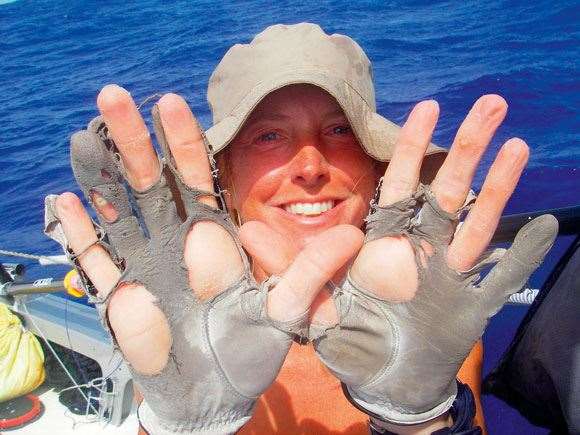A decade ago, Roz Savage, a 34-year-old London office worker, decided to undergo an odd piece of self-: analysesshe sat down and wrote two versions of her own obituary.
A decade ago, Roz Savage, a 34-year-old London office worker, decided to undergo an odd piece of self-: analysesshe sat down and wrote two versions of her own obituary.
 Protective Gloves worn through... Images: Courtesy of Roz Savage
Protective Gloves worn through... Images: Courtesy of Roz SavageThe first was the obituary she wanted read at her funeral – a rollicking yarn of adventures and risks, of spectacular failures and glorious successes. The second was the obituary she was heading towards – a conventional spiel of safety and comfort, of dull achievement and stale ease. When she’d finished writing, she sat at her desk and wondered at the difference between the two. She decided something had to change.
Gradually, she began to slough away the luggage of her old life, the stuff that was anchoring her at bay. “I felt I was getting a few things figured out,” she says. “But I was like a carpenter with a brand-new set of tools, and no wood to work on. I needed a project. And so I decided to row the Atlantic.” In 2005 she pushed off from the Canary Islands and heaved the oars until she nosed into Antigua. After that she shifted her sights to the Pacific. In ’08 she rowed from San Francisco to Hawaii, in ’09 from Hawaii to Tarawa, in ’10 from Tarawa to Papua New Guinea. In numerical terms, the crossing of those oceans equates to 12,800 kilometres of rowing, three million oar strokes, 312 days alone at sea. And she’s not done yet. This month she’ll row from Perth to Mumbai, adding the Indian Ocean to her resume. In 2012 she’ll row from New Jersey to London, completing her circumnavigation of the globe. It’s not all a quest of self-discovery; as a United Nations Climate Hero her voyages are also aimed at raising awareness of the dangerous amount of rubbish that’s emptied into our oceans.
Going Alone
“I’m always being asked: why go solo? Well, there are many reasons. I’m pretty happy in my own company – although when on dry land I love being around people. It’s nice to have the contrast between the solitude and the sociability. I also want to prove to myself that I can do these big challenges on my own. Being a lazy person, I know that if I had a crewmate, I’d end up letting them do the bits I don’t want to do, so going alone forces me into new learning experiences I may avoid otherwise.
“Beyond this, there are a lot of decisions to be made – not just during the row, but about aspects of the boat design, the course to row ... Being alone avoids disagreements and resentments over compromises. I know that when I’m stressed and tired I find it hard to be considerate towards another person. In this respect I find it easier to be alone than to have company. If there’s ever a mutiny on board, I’ve definitely been on my own for too long ... ”
Related Articles

Morri: Golf at Riviera is golf worth watching

Review: Titirangi Golf Club













